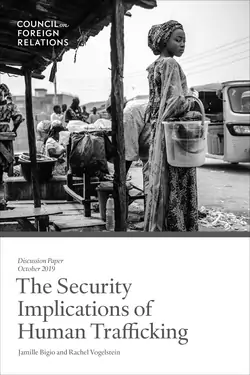
The Security Implications of Human Trafficking

Human trafficking can fuel conflict, drive displacement, and undercut the ability of international institutions to promote stability. The United States should work to disrupt and dismantle the criminal networks and terrorist groups that exploit conflict-related human trafficking, while prioritizing the prevention and prosecution of and protection from human trafficking in conflict contexts.
- Report
Overview
Human trafficking is a gross violation of human rights that affects populations across regional, ethnic, and religious lines. It encompasses a range of illicit activity, including sexual exploitation, forced labor, organ removal, and forcible recruitment into an armed group or military service. In 2016 alone, the United Nations detected close to twenty-five thousand victims of human trafficking, though this figure hides many unreported cases. Seventy-two percent of them were women and girls. Globally, an estimated 40.3 million people in 2016 were entrapped in modern slavery—exploitative situations they could not leave or refuse due to coercion, deception, threats, or violence.
But human trafficking is not only an affront to human rights and dignity—it is also a criminal and security concern. Human trafficking can fuel conflict by enabling armed and extremist groups to raise revenue and expand their power and military capabilities. Human trafficking can also drive displacement and destabilize communities, thereby exacerbating conflict and undermining development. When committed by security forces and peacekeepers, human trafficking undercuts the ability of international institutions to carry out their missions of promoting peace and stability.
More on:
Despite the security implications of human trafficking, convictions for trafficking offenses are rare, programs focused on prevention and protection are under-resourced, and most efforts to address human trafficking are detached from broader conflict-prevention, security, and counterterrorism initiatives. To prevent human trafficking and advance U.S. security interests, the Donald J. Trump administration should use sanctions to apply a travel ban and asset freeze on human traffickers; pursue charges against Islamic State affiliates of sexual slavery and other forms of human trafficking; encourage troop-contributing countries to hold accountable peacekeepers who perpetrate sexual exploitation; collect intelligence on human trafficking in locations where it already tracks drug and arms trafficking; and lead by example by ensuring that its policies on migration and asylum disincentivize trafficking and support its victims. These steps will help the United States and its allies reduce human trafficking in conflict and terrorism-affected contexts while promoting broader peace and stability.
This report was written under the auspices of the Women and Foreign Policy program, whose work on human trafficking, conflict, and security is supported by Humanity United (HU). The opinions expressed are those of the authors and do not necessarily reflect the views of HU.
Professors: To request an exam copy, contact [email protected]. Please include your university and course name.
Bookstores: To order bulk copies, please contact Ingram. Visit https://ipage.ingramcontent.com, call 800.937.8200, or email [email protected]. Include ISBN: 978-0-87609-775-5.
More on:
 Online Store
Online Store